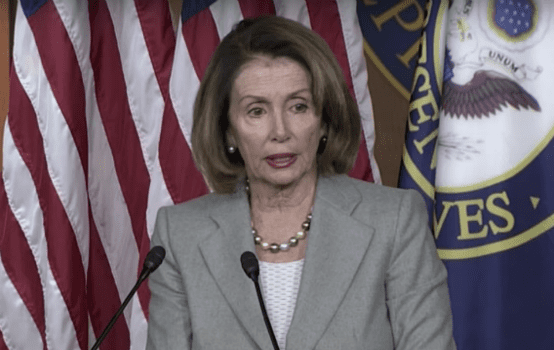A Chance for Pelosi To Make Good On Peace

Nancy Pelosi won her party’s support to become speaker of the House today. When she last wielded the speaker’s gavel, she rode an antiwar wave to power. The Iraq war was at its nadir and Democrats seized control of Congress in a repudiation of George W. Bush, winning the House for the first time in a dozen years.
That’s how the Democrats won in 2006. But just as Republicans pledge balanced budgets and smaller government on the campaign trail only to run gargantuan deficits once safely in office, the party of Woodrow Wilson and LBJ seldom delivers on peace and civil liberties after Election Day, no matter how they campaign.
Pelosi’s first stint as speaker was no different. Democrats campaigned on winding down Bush’s wars and checking his exercise of executive power. Instead we got the surge, an increase in troops in Iraq that could have marked an escalation of the war, fully funded by a Democratic Congress holding the power of the purse, with no meaningful retrenchment in sight until well into Barack Obama’s first term.
As Democrats get ready to retake control of the House, though not the Senate, will anything be different the second time around? Pelosi’s top lieutenant leadership elections remains Steny Hoyer, who voted for the war. Senate Minority Leader Chuck Schumer also was an “aye” on authorizing the use of force in Iraq, as was Tom Daschle and Harry Reid before him.
Pelosi’s Democrats are further removed from the 9/11 terrorist attacks, which understandably left the American people susceptible to arguments conflating Osama bin Laden with Saddam Hussein. But these Democrats also ran comparing Russian efforts to influence public opinion in the 2016 presidential to the murderous assault on the World Trade Center, baiting President Trump into great conflict with Moscow and largely remaining quiet about the undeclared presidential wars that have now spanned three administrations of both parties.
Indeed, Bill Kristol, Max Boot, the Washington Post’s Jennifer Rubin and former aides to Bush and the late Sen. John McCain have reinvented themselves as members of the Resistance. One can now appear alongside principled progressives like Chris Hayes or Rachel Maddow on MSNBC despite having sold the Iraq war as long as their anti-Trump jeremiads are sufficiently scathing.
Yemen could be different. Already the Senate is moving toward cutting off U.S. support for Saudi Arabia’s war there, as the brutal murder of journalist Jamal Khashoggi has refocused Washington on the character of the Riyadh regime—and the deepening humanitarian disaster being inflicted on the Yemeni people on the American taxpayer’s dime. This is despite Secretary of State Mike Pompeo’s insistence that the suffering in Yemen would be “a hell of a lot worse” without this assistance.
The debate over Yemen could raise the profiles of pro-peace progressives like Reps. Ro Khanna, D-Calif., and Tulsi Gabbard, D-Hawaii, who are in the majority for the first time. Constitutional conservatives like Sens. Rand Paul, R-Ky., and Mike Lee, R-Utah, can use the controversy to reassert dormant congressional war powers.
With liberal hawks like Sen. Robert Menendez, D-N.J., flipping to vote in favor of invoking the War Powers Resolution to end U.S. backing for the war, the Senate could be on the cusp of a decisive break from the status quo. That presents the incoming Democratic majority in the House with an opportunity to do more than campaign against war—an opportunity they missed on Iraq over a decade ago.
“Yemen is a symbol of our continued military hubris in the Middle East,” Sen. Chris Murphy, D-Conn, told Rolling Stone. “An addiction Obama was supposed to cure but didn’t.” An addiction Trump was supposed to cure too.
In the new Congress, hopefully the doctor is finally in. If so, a constant flow of Alexandria Ocasio-Cortez magazine profiles and videos would be a small price to pay.
W. James Antle III is editor of The American Conservative.
Comments